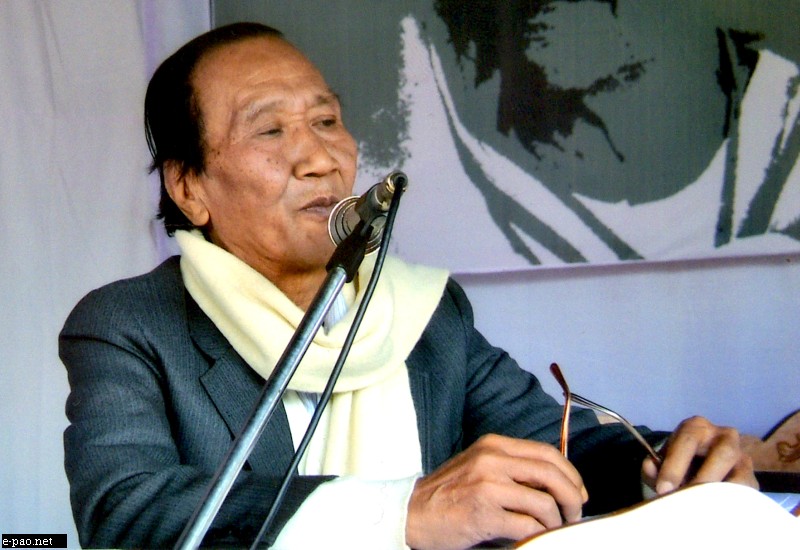Sanakeithel : A haven to think through
Rekha Konsam *

National Film Awardee MA Singh (Maibam Amuthoi)
Pix by Sunzu Bachaspatimayum
The movie 'Sanakeithel' marks the directorial debut of Maibam Amuthoi Singh. Released in 1983, the film is based on a story penned by Nongmaithem Pahari Singh and produced by Th. Doren Singh. It is one of the most memorable products of Manipuri Cinema and one that remains relevant to this day.
The film starts with the life of a simple young widow and her infant son living a quiet life in a residential area. She lives a typical life of the time supporting herself and her child through neighbourhood ties and helping out people in return for help from them. As a married woman, she firmly believes that her place is by her husband's home and so does not wish to go back to her brother's house to live as a dependent on him.
However, as a young woman herself and having been widowed early, life is not easy for Nungshi. Without a husband, she is responsible not only for herself but also to provide for her infant child. She is left to fend for herself. She has limited means but she carries on with what she can for society can be judgemental and suspicious of a young widow or a household without a man.
Nungshi's life is disrupted when one day she falls victim to the lascivious behaviour of a group of men. She was on her way back from the market after purchasing daily necessities and a toy for her son. The four men pick her up off the lonely stretch of road and carried her away and gang rape her. She is left in a dishevelled state like a ragged doll discarded after use. Her dignity as a human being is shredded. The violence of the action shatters her and leaves her in a state of shock.
The incident leaves a devastating impact on Nungshi. It leaves her physically, emotionally and psychologically wounded. The household necessities that she purchased from the market lies strewn on the ground just as she as a person and her life has been strewn by the violence. She tramples over the toy, no longer seeing the object that she bought with much love just moments ago. The household items, the toy, the home, her life - all of these are shadowed in the numbed daze of her shocked state. As she steps over and walks away from these objects, she symbolically walks away from domestic life. She no longer has a 'home' to go back to.
Left without parents, Ibungobi grows up in the care of his maternal uncle. The family is also not without its own problems and soon he feels himself to be an unwanted burden. One day he runs away and with nowhere to go, he ends up at the market place. Here, he finds refuge and friendship with a group of men who make their living through unsavoury choice of work that would otherwise classify as petty crimes. He lives with them and does his part by cooking for them. Like him, they also find refuge and seek survival through the busy market.
The city as we see through the market offers a different vista. The market, or more specifically the market place, is largely a place where transactions take place. People go there to buy what they need and there are people selling goods. But the market is also a place that attracts all kinds of people: from a pick pocket Ali, a cycle thief Khansa, a dealer of stolen goods John, their gang leader along with Babu, a physically challenged beggar and Ibungobi, a run-away child.
It is also where Nungshi finds a place for herself after losing her sanity. Seen thus, it is no longer a place for transactions but a haven - a refuge for those who have nowhere to go and no other means of survival.
In the haven that is the keithel (market), Ibungobi comes into contact with his estranged mother. It is, however, not a re-union of mother and son, for Nungshi only has blank stares that does not seem to register either her son or what is going on. Deprived of what many take for granted, Ibungobi has never had the warmth of a normal family. He is overcome by love for his mother but is not able to come to terms with the condition that he finds her in. He is conflicted.
A mother is selfless and protective of her children, or so we are told. However, in Sanakeithel rather than the mother looking out for the child, it is the minor son who cares for her even as he does not openly acknowledge her as his mother. His feelings, affections, frustrations, outrage - all remain contained within him. It is only towards the end that these bottled-up emotions burst forth.
One night he comes across her being strangled at the corner where she was taking rest for the night. The young son comes to the rescue of his helpless mother and strikes the attacker. In his frustration, he cries out calling her a mad woman and rants at her for being mad. 'Angaobi! Nang karigi ngaorino ?'At the end of the tirade, he longingly reaches out calling 'mother' and embraces her. This is the only time in the film when he calls his mother thus.
The son acknowledges his mother but she still has no cognizance. The struggles along with banters shared co-residing with the other men have come to an end for Ibungobi as each of them have met their ends. Theirs have been short eventful lives. Nungshi continues to exists, but it is more of an existence rather than living a life.
Life is bitter sweet. As the call of the night watchman ironically reverberates at the beginning and the end of the film - sab theek hai (all is well).
But is all really well ?
